The Blue Jays are already at Spring Training in Florida, but this one stayed north. Image © John Degen
Shore Report acknowledges the North Shore of Lake Huron is the traditional land of the Anishinabek and the Métis Nation. This is Treaty 61 (Robinson-Huron) territory. Anishinabek have lived in the Great Lakes region for thousands of years. Shore Report is very grateful to live and work here.
All written content in this issue is © Shore Report 2025
Shore Report will be away from our desk for the next two weeks on other business, and while we will not publish special reports here during that time, we will work to keep everyone informed by placing news items of note on our Facebook group and directly into the Substack feed. If you are not yet a member of our Facebook group, or haven’t yet followed us on Substack, please do so. We’re building community on the North Shore.
Recent footage from Shore Report’s back deck. Look familiar? It’s almost over.
It’s been a long, cold, and snowy winter on the North Shore, but calendars don’t lie. We’re only a couple weeks from the official first day of spring. Good tree-pruning time, and we hope you have your seeds ready for that fabulous garden you’re planning.
See you at the end of the month.
Editorial
Promises Made. Okay… Let’s See Them Kept.
During the Ontario leaders’ debate on northern issues that took place at Canadore College in North Bay on February 14, 2025, Premier Doug Ford repeated past promises to restart the Northlander passenger rail service (a promise he first made in the 2018 election), complete the four-lane upgrade of Highway 69 (most recently promised for completion in 2021), improve healthcare access, support addiction and homelessness services, and protect northern industry from the threatened US tariffs.
While his party fared less well in the north than it did in Southern Ontario (a surprisingly strong win in Algoma-Manitoulin, and a squeaker in Sault Ste. Marie), those promises remain on the record, and we on Lake Huron’s North Shore will be watching to see just how quickly our issues and needs are prioritized into action.
It certainly didn’t inspire confidence that North Shore PC candidates remained mostly out of contact with media during the campaign. Shore Report (headquartered in Thessalon) joins with our fellow citizens in congratulating former Thessalon Mayor Bill Rosenberg on his move to Queen’s Park. As Rosenberg heads south, he carries with him a reputation as a straight-shooter and a person of action for local development. He’s certainly done nothing but improve Thessalon in his seven years heading up municipal government. We are hopeful he can have the same impact on the entire region.
Espanola Lands $2 Million in Federal Support for Housing
Housing Accelerator Fund monies to run services to vacant lots primed for development
by Shore Report staff
Seal of the Town of Espanola. Image © John Degen
The North Shore town of Espanola’s plan to build 400 new homes over the next decade got a significant boost in February from the federal government’s Housing Accelerator Fund (HAF). The town has received a $2 million grant from the HAF which, it says, will be aimed at the completion of the first 64 new homes in their plan.
According to the Canadian Mortgage and Housing Corporation (CMHC), the federal government hopes the HAF will result in a total of 750,000 new homes across the country in the next ten years.
Espanola’s action plan will see zoning amendments aimed at increasing density, a policy review on height restrictions and lot sizes, a climate adaptability plan, a land utilization strategy, and changes to speed up permitting. A notice on the town’s website indicates a portion of funding from the grant will service those actionable goals, but the “majority of the grant will be put toward road, water and sewer infrastructure to provide servicing to vacant properties for development.”
Does the United States Want the Entire Great Lakes?
Meetings between the President and Prime Minister suggest they just might
Great Lakes decal on the back of Shore Report’s mobile news-gathering station. Image © John Degen
A report in the March 7th New York Times indicates US President Donald Trump may be using his on-again-off-again tariff threats against Canada as a kind of “economic force” intended to weaken Canada’s economy to the point where the United States might be able to implement some dramatic changes to our sovereign relations.
While public statements from the President link his tariff tirade to border issues involving the illegal street drug fentanyl and illegal aliens crossing from Canada into the US, the Times suggests those are merely a front for what looks like possible annexation of key territory, including the entirety of the Great Lakes.
“[Trump] told Mr. Trudeau,” the article states, “that he did not believe that the treaty that demarcates the border between the two countries was valid and that he wants to revise the boundary. He offered no further explanation… Mr. Trump also mentioned revisiting the sharing of lakes and rivers between the two nations, which is regulated by a number of treaties, a topic he’s expressed interest about in the past.”
The United States’s growing problems with fresh water are well known, what with a historic string of drought years, and the dropping of water levels in key western reservoirs such as Lake Mead (in Nevada and Arizona), and Lake Powell (in Utah and Arizona). The Colorado River is now in a state of emergency known as “aridification,” which will be extraordinarily difficult to reverse if current conditions persist.
Low water levels have obvious negative implications for US farmers and food production, but given the importance of hydroelectric dams such as Hoover and Glen Canyon, a state of “dead pool” in Lakes Mead and Powell could also disrupt the western power grid catastrophically.
Given that the Great Lakes (and the rivers flowing into and out of them) are the largest freshwater system on earth, they would be a naturally attractive target for a thirsty US administration. How such an acquisition would take place is unclear — and more than a bit frightening — given the current president’s musings about both Greenland and the Panama Canal being taken by force if necessary.
According to the Times report, President Trump has expressed a desire “to tear up the Great Lakes agreements and conventions between the two nations that lay out how they share and manage Lakes Superior, Huron, Erie and Ontario.”
A report from Toronto Metropolitan University explains that “Great Lakes management lies within multiple national and subnational jurisdictions in Canada and the United States.”
The many agreements governing these waters include the Boundary Waters Treaty, the Great Lakes Water Quality Agreement, the Great Lakes Charter and Annex, and the Canada-Ontario Agreement on Great Lakes Water Quality and Ecosystem Health.
Obviously, annexation of the Great Lakes or any new portion thereof would have profound implications for North Shore First Nations, towns, and cities.
Shore Report will, reluctantly, continue to follow this story.
Elliot Lake Water System Set for Repairs
Overall good report on water treatment notes aging structure and equipment
Assistant Director of Public Works, Bart Doyle delivers the report. Image courtesy City of Elliot Lake.
The 2024 report to Council on the Elliot Lake Water Plant notes no non-compliance incidents, but does suggest that upgrades and repairs to aging equipment “will likely be necessary during the 2025 planning period.” The report was presented to Elliot Lake City Council at its February 24th meeting by the Assistant Director of Public Works, Bart Doyle.
A total of 33 “adverse water quality incidents” are recorded in the report, all of which appear to have been addressed effectively. Broken watermains represented the majority of incidents.
After presentation of the report, Councillor Merrill Seidel made a point of thanking Doyle and the water treatment staff “for assuring that the residents of Elliot Lake have 100% clean drinking water; not 98, not 97, but 100%.”
Elliot Lake Council passes the water report. Image courtesy City of Elliot Lake.
The Votes are In
Huron's North Shore adds a bit more blue to the orange
by Shore Report staff. Originally published as an election special report. Updated with revised votes counts and results.
Your North Shore MPPs.
The 2025 provincial election is over, and Premier Doug Ford’s PC party will be returning a majority government to Queen’s Park in Toronto, a record-breaking third straight. It is a mixed bag for all major parties, with the PC realizing only a small increase in both seats and popular vote. Turnout was predictably low for a midwinter snap election called on dubious grounds. Elections Ontario is reporting province-wide turnout at 45.4% of eligible voters.
The NDP, under Marit Stiles, has retained official opposition status, and remained stronger than appeared possible in polling, and despite a decrease in seats. Always popular in the north, the NDP retains the Nickel Belt and Sudbury ridings. Stiles spent plenty of campaign time in North Shore ridings, where she made major platform announcements, and was a clear winner in the leader’s debate on northern issues.
Liberal leader Bonnie Crombie underperformed terribly, losing her own Mississauga East —Cooksville seat and keeping her party in third place, yet increasing the Liberal share of the popular vote and gaining back official party status. In her concession speech, Crombie committed to staying on as leader despite losing her place in the legislature. That is going to require a successful Liberal stepping aside and giving Crombie their seat.
The election result means definite (and possible) change to the North Shore map. The NDP lost a riding and very nearly gained one. A historically close race to replace retired Sault Ste. Marie PC MPP Ross Romano has finally been decided (by 114 votes) in favour of PC Chris Scott.
Thessalon’s popular mayor, Bill Rosenberg, made a very robust showing, taking Algoma-Manitoulin for the PCs from the NDP, though that almost certainly reflects a desire for a seat at the government table rather than a turn away from traditional North Shore issues.
Voter turnout across the North Shore surpassed the provincial average, despite… you know… February. With roughly half the eligible voting public making it to the polls, the region clearly takes elections more seriously than our provincial southern neighbours.
Here are the summaries. More coverage to follow as the impact of these voter decisions becomes clear.
Sudbury:
NDP incumbent, Jamie West, retains his seat and will return to Queen’s Park for Sudbury. A closely fought race with local pizza shop owner Max Massimiliano that resolved into a solid 46% victory for West. And Sudbury gets to keep its excellent pizza.
Results and electoral map courtesy elections.on.ca
Nickel Belt:
Hugely popular France Gélinas (NDP) retains her seat in an historic sixth straight win, beating the combined efforts of both the PC and Liberal candidates. Higher than average voter turnout here surely indicates a deep loyalty to the candidate, who was even praised by Greater Sudbury Councillor Natalie Labbée, running to unseat her. As Labbée indicated in her Shore Report interview, she will now continue as a City Councillor, and work with Gélinas for the good of the region.
Results and electoral map courtesy elections.on.ca
Algoma-Manitoulin:
Thessalon mayor, Bill Rosenberg, a very popular local figure along the North Shore, has somewhat easily wrestled this huge riding from the NDP. Voter turnout here was the highest along the North Shore, surpassing the provincial average by 6%. The relative enthusiasm to vote clearly indicated a desire for change, after scandal removed the sitting MPP from the NDP caucus, bringing chaos to what might otherwise have been a comfortable orange win.
Rosenberg’s impressive victory was no doubt aided by a split vote on the incumbent side, as Independent Michael Mantha drained significant vote from his former party’s exciting new candidate, North Shore paramedic David Timeriski. But that split vote does not fully account for Rosenberg’s final tally, and he heads to Queen’s Park with a strong mandate and great expectations for being a powerful northern voice on healthcare and infrastructure. Folks all along the North Shore will certainly expect him to work toward saving Thessalon Hospital, and speed promised highway upgrades.
Former Grand Chief of the Anishinabek Nation Reg Niganobe’s unsuccessful run as Liberal candidate is hopefully not the last we’ll see from this proven public servant and local leader.
Results and electoral map courtesy elections.on.ca
Sault Ste. Marie:
Wow. The PCs retain Sault Ste. Marie by a mere 114 votes, the smallest margin here in 120 years. Newbie PC candidate Chris Scott won over veteran City Councillor and NDP candidate Lisa Vezeau-Allen in an absolute squeaker.
Results and electoral map courtesy elections.on.ca
Shore Report did our best to cover the provincial election for the region, interviewing as many candidates as possible, and highlighting the issues important to local residents. The surprise nature of the election seemed to catch a lot of candidates off guard, making media contact spotty.
As well, it would seem Premier Ford’s party had some sort of no-interviews edict in place. We were unable to speak directly with any of the PC candidates along the North Shore.
How to put this delicately?… that sucks. Candidates refusing to be scrutinized by local media is terrible for democracy. Shore Report will continue to work to bring its readers in contact with local decision makers.
We thank all of the candidates across the North Shore. Political campaigns are notorious life-disrupters. Shore Report recalls how our interview with Nickel Belt Liberal candidate, Natalie Labbée, had to take place late in the evening because she’d been called away to take care of an aging parent. It shows genuine care for public service that so many excellent candidates stepped forward for the North Shore.
Huron Shores’ New Mayor Takes Her Chair
Jane Armstrong is the municipality’s first female executive
by Shore Report staff
Jane Armstrong taking her oath of office. Image courtesy Huron Shores.
The February 12th meeting of the Municipality of Huron Shores began with the swearing in of new Mayor Jane Armstrong. Former Mayor, Matthew Seabrook, resigned in early January, citing conflicting views with the majority of Council. The resignation came at a very tricky moment for the Municipal Council, as the Dean Lake Road Bridge had just been closed, and local residents were preparing to fill the local Iron Bridge Lions Club hall to find out why.
Given that municipal elections are a little over a year away, Council made the decision to appoint a replacement, and sitting Ward 3 & 4 (Village of Iron Bridge, Gladstone, former Township of Thompson) Councillor Armstrong stepped up.
Mayor Armstrong’s tenure started off with a direct challenge, as her first order of business was hearing a delegation from a local Ward 3 & 4 resident concerned about property taxes and value assessments.
Resident Carl Ashford peppered his presentation with respectful congratulations for Armstrong’s appointment to the executive chair, but the meat of his complaint involved the suspicion the municipality has made some mistakes in their property rolls, designating some structures as part of the wrong properties, affecting both assessments and the amount of tax billed. Mayor Armstrong thanked Ashford for his presentation, and assured him it would be discussed by Council.
Later in the meeting, the Mayor notified Council she had attended the recent healthcare meeting at the Thessalon Legion Hall, speaking with Thessalon councillors and the Mayor of Richard’s Landing about the North Shore healthcare crisis. She intends to form a North Shore coalition to present resident concerns to the Ministry of Health and at the Federation of Northern Ontario Municipalities (FONOM).
New Thessalon Mayor and Deputy Mayor Appointed
Provincial election ends former mayor’s term
by Shore Report staff
Deputy Mayor Tracey Cooke and Mayor Jordan Bird, of Thessalon. Image courtesy Town of Thessalon.
Councillor Jordan Bird, the former Deputy Mayor of the Thessalon, has been appointed to the executive chair after former Mayor Bill Rosenberg’s resignation. Following the recent provincial election, Rosenberg is the new MPP for Algoma-Manitoulin, the huge northern riding that includes Thessalon. Replacing Bird as Deputy Mayor is longtime Councillor Tracey Cooke.
Both Bird and Cooke bring extensive Council experience to their roles, having worked closely with the former mayor throughout his highly successful tenure at the town office. One imagines their continuing relationship with the area’s new MPP can only work in the town’s favour.
The Highway 17 town is looking to expand housing across the TransCanada, build a cooling centre for increasing days of extreme heat, construct a new school for K-6 students, rebuild service levels at its North Shore Health Network site, and continue the ambitious improvement agenda of the former mayor.
Is Sault Ste. Marie a Republic?
Mayor Shoemaker speaks out against King Charles III
by Shore Report staff. Originally published as a special report.
Official Canadian portrait of King Charles III, by Millie Pilkington. Courtesy the Department of Canadian Heritage.
A report from CTV News indicating a “no comment” from the British monarch on US musings about annexation of Canada as a “51st state” seems to have struck a republican chord for Sault Ste. Marie’s mayor.
The March 1 story by CTV’s Spencer Van Dyk begins: “Buckingham Palace is refusing to weigh in on U.S. President Donald Trump’s persistent attacks on Canadian sovereignty.” CTV News wrote to the King for his opinion, and received a note back from one of the royal communications secretaries. “This is not something we would comment on,” said the note.
The mayor’s Facebook post, referring to the British monarch as “this guy.”
The palace’s polite response clearly angered Sault Ste. Marie’s top elected official. Mayor Matthew Shoemaker took to social media to vent his ire.
“Absolute nonsense!” he wrote in an early March 2 posting. “The monarchy does not and has not, for generations, been a proper representation of the country [Canada] has become… Further evidence of the complete uselessness of this institution to Canada.”
Shoemaker, who swore allegiance to King Charles III when he took office in November 2022, seems to have taken a turn from that loyalty oath. His Facebook posting indicates he earlier decided not to hang the King’s portrait in the Council chambers.
“This confirms it was the right decision not to put up King Charles’ photo in council chambers when I became Mayor, and I’ll be looking into what legal alternatives there are to future pledges of allegiance to the Crown.”
While it is not a law that the monarch’s portrait must hang in official chambers in Canada, it is a tradition dating back to the very beginnings of the country. At the death of Queen Elizabeth II in 2022, municipalities had to decide what they would do with official portraits, old and new.
According to the official royal website in the UK, remaining neutral, and not commenting on politics is actually the expected practice for a sitting monarch. For strict Parliamentarians, the palace’s “no comment” was most proper, no matter how much they might personally prefer to hear the King’s true sentiments about US threats to Canadian sovereignty.
“As Sovereign, The King holds a weekly Audience with the Prime Minister to discuss Government matters,” says the King’s website. “The Monarch remains politically neutral on all matters, but he is able to ‘advise and warn’ his ministers – including his Prime Minister – when necessary. These Audiences are entirely private.”
Anti-monarchist sentiment is not new in Canada. The choice to remain, at least symbolically, under the rule of the British Crown, rubs a lot of citizens the wrong way. Britain’s long history of colonialism and conquest is part of that Crown, and many Canadians would like a clean break to Parliamentary republicanism.
Canadian republicanism has existed since before Confederation, with the 1837 Rebellion the most dramatic historical instance.
Shore Report has reached out to Mayor Shoemaker for comment.
North Shore Rallies for Healthcare
Demonstration keeps up the pressure to save Thessalon hospital site
by Gordon Graham, Shore Report Special Correspondent. This article was originally published as a special report, and has been edited to take in the provincial election results.
Carol Hughes, NDP MP for Algoma—Manitoulin—Kapuskasing and provincial NDP candidate David Timeriski braving the cold and the highway.
Saving the Thessalon hospital emerged as the top issue for the North Shore town (and other regional residents) in the recent Ontario election.
On February 19, about 100 people marched from the hospital to the nearby Trans-Canada Highway, waving signs to demand funding for the site, which has been closed on several recent occasions.
The Thessalon site of the North Shore Health Network provides the only emergency services in 150 km of highway between Blind River and the Sault Area Hospital in Sault Ste Marie.
Demonstrators waved signs at passing motorists in cold, clear weather with a wind chill of -20C. Almost every passing trucker slowed and honked to show their support.
“On such a cold day, this is amazing to get over 100 people out,” said Mary Jane Thompson, the main organizer of both the march and the earlier town hall meeting about the hospital. “And we know many more people who agree who just couldn’t come out in this cold.”
Retired school teacher, Mary Jane Thompson, is leading this small town’s protest against a province-wide crisis in healthcare access.
The marchers assembled at Thessalon Hospital, and heard brief remarks from Al Dupuis from the Algoma Health Coalition, Mike Hurley from CUPE, and Sharon Richer from the Ontario Council of Hospital Unions.
Every speaker blamed Doug Ford for the uncertain future of the Thessalon Hospital and the larger crisis in provincial healthcare. But they held out hope for the demonstrators.
“When the hospital in Richard’s Landing [on St. Joseph’s Island] was threatened a few years ago, people rallied to save that one-bed hospital,” said Dupuis.
“So, we’re putting out two clear demands today. We demand that emergency services in Thessalon remain open, and that the hospital beds here are re-opened with adequate funding to ensure their future.”
Eventual election winner, Bill Rosenberg, was a no-show at both events about the town’s hospital.
NDP candidate David Timeriski, on the other hand, attended both.
“I’m a paramedic,” he told the Shore Report. “And I’m a private citizen. So, I have a vested interest too. I’m going to keep coming to all these events for the hospital here.”
Carol Hughes, NDP MP for the soon-to-be-dissolved federal riding of Algoma—Manitoulin—Kapuskasing, and defeated Independent MPP Mike Mantha also attended both events.





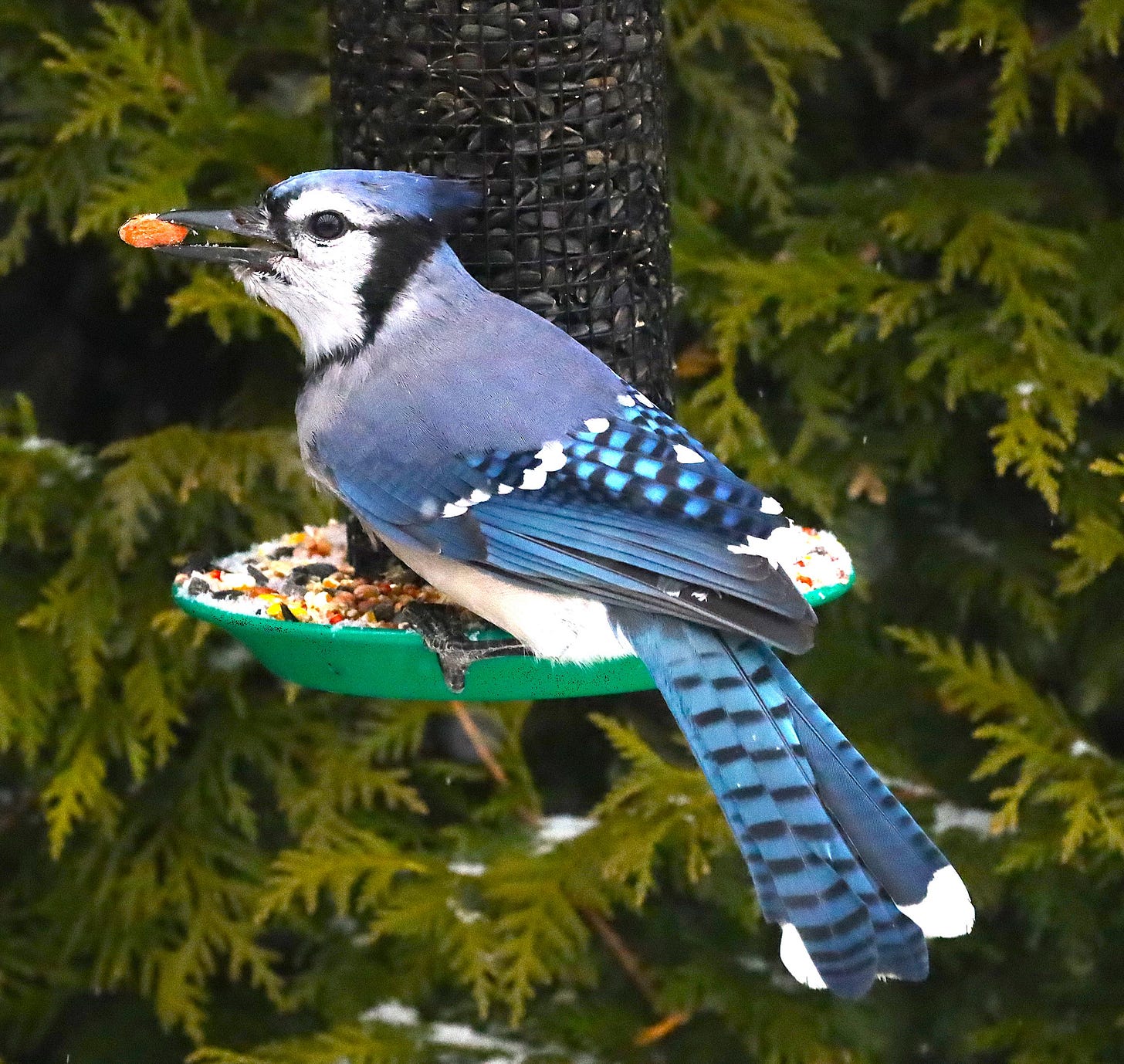
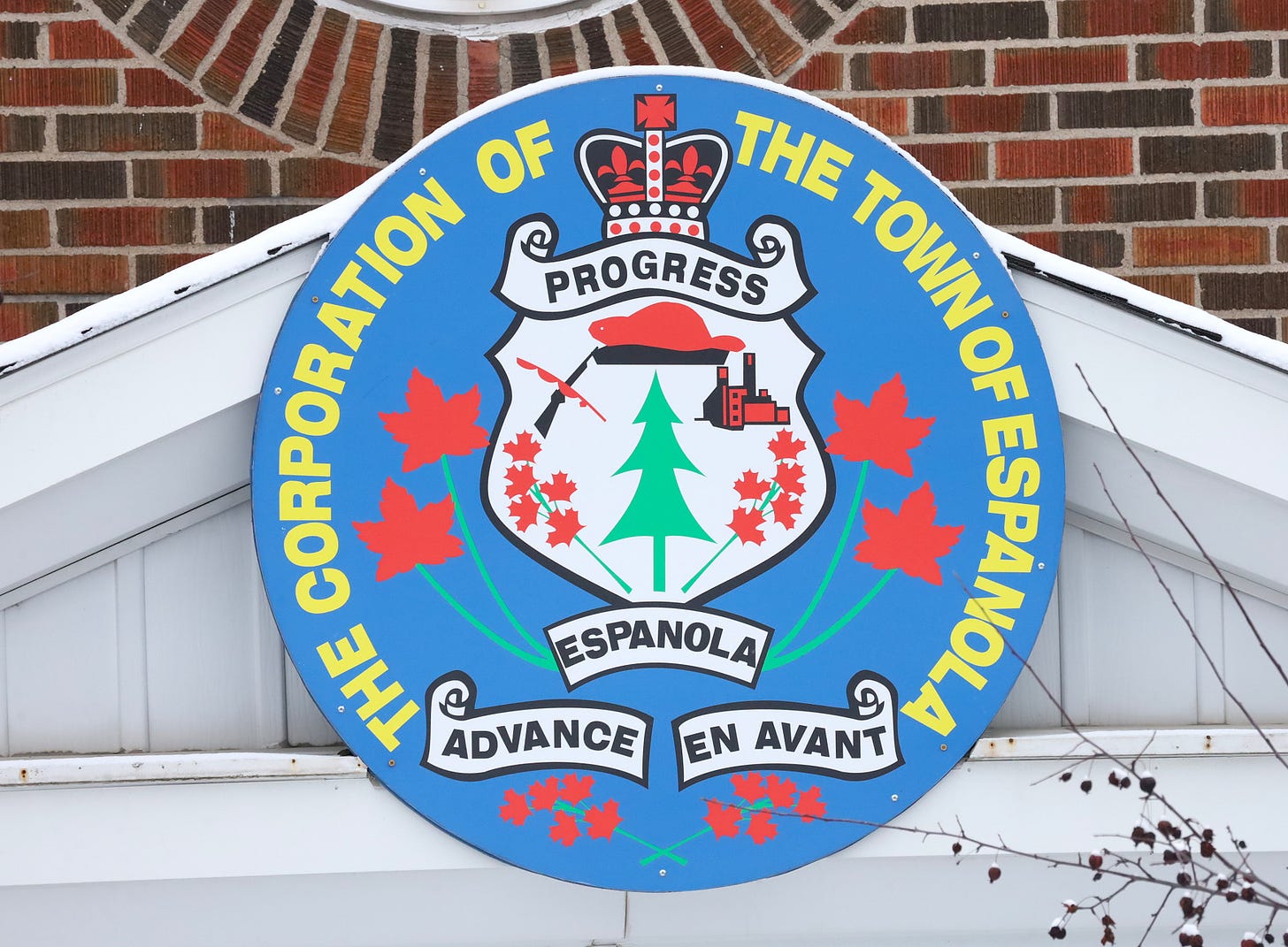

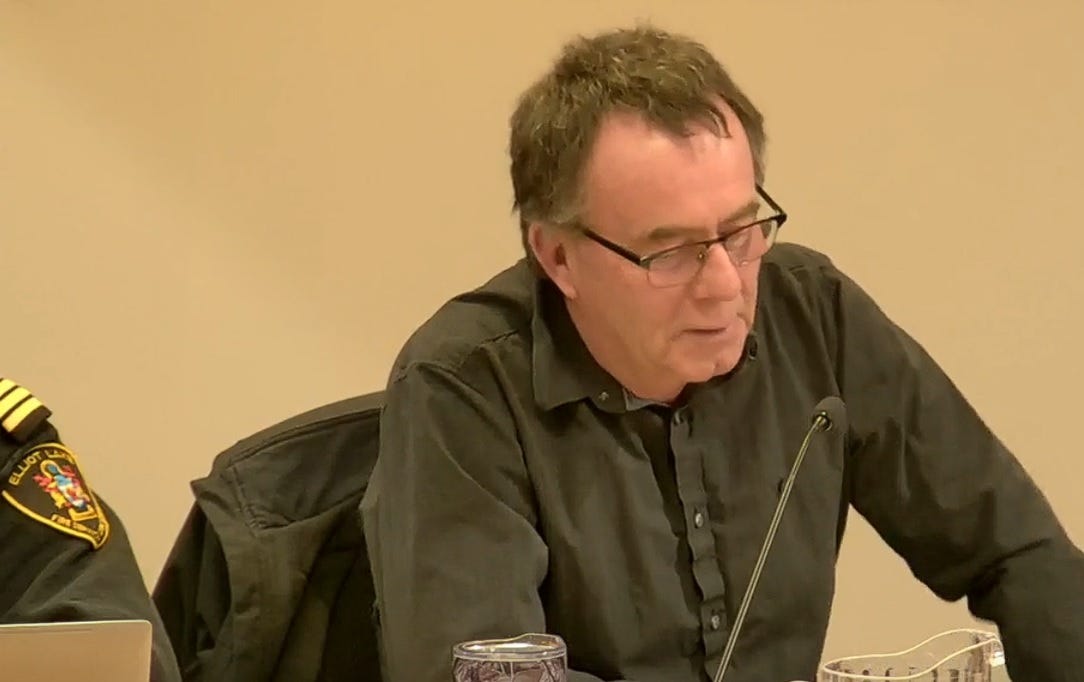
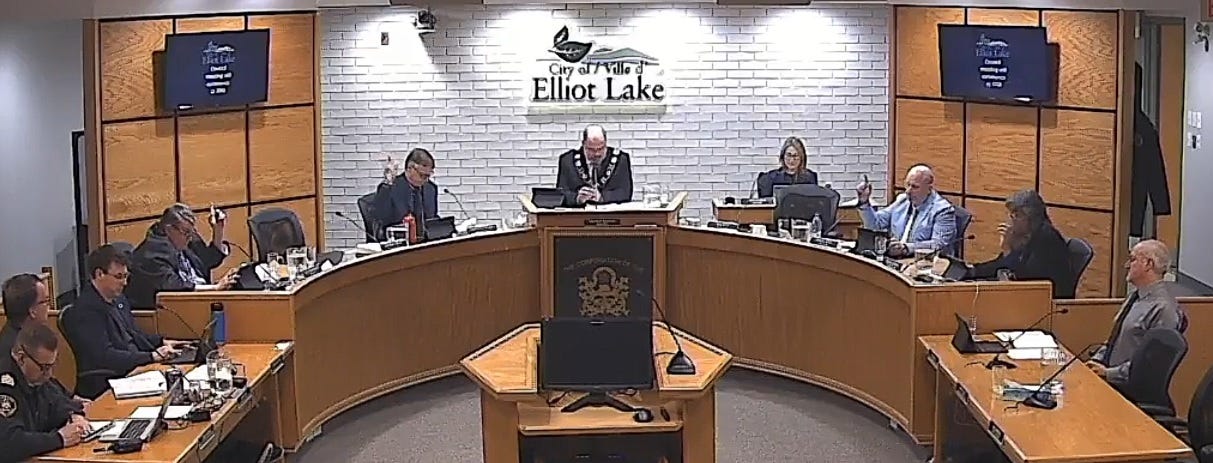

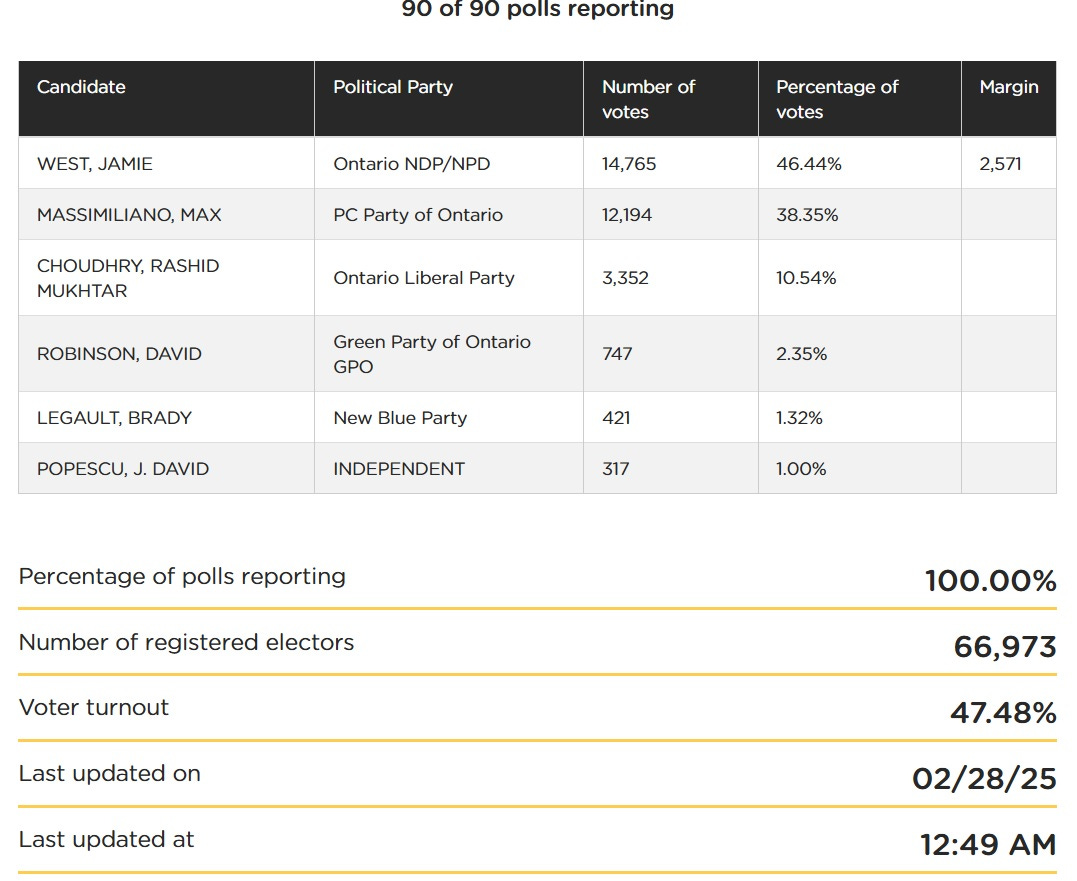
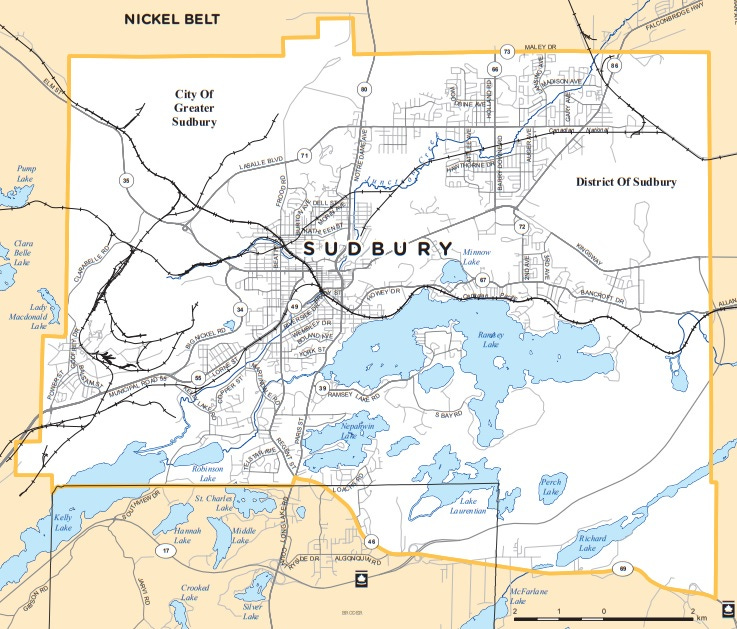
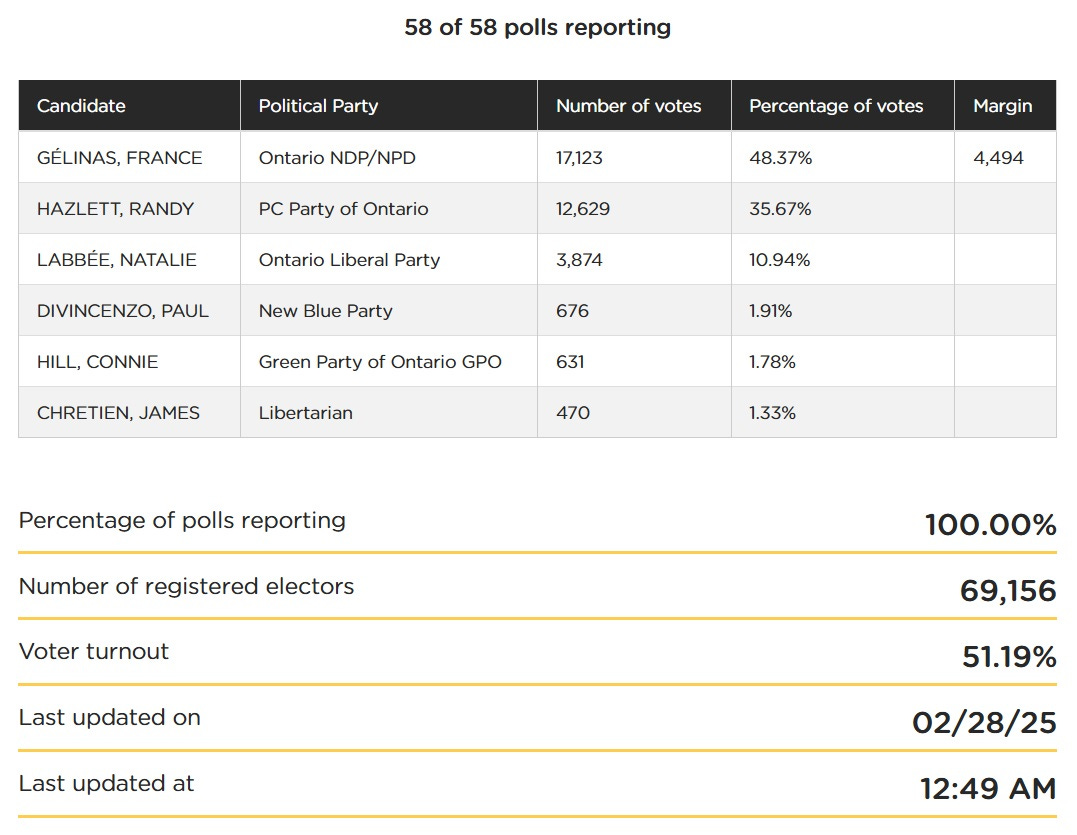
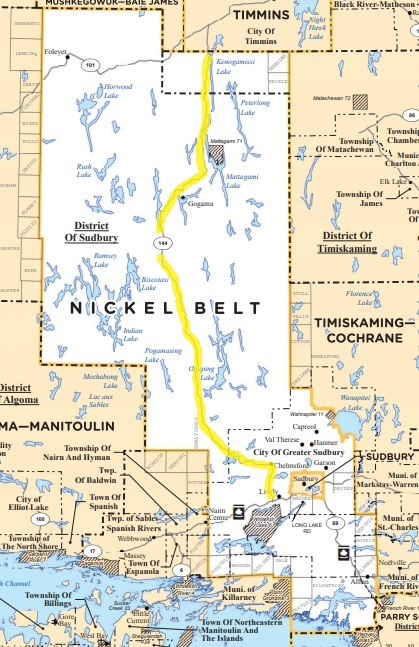
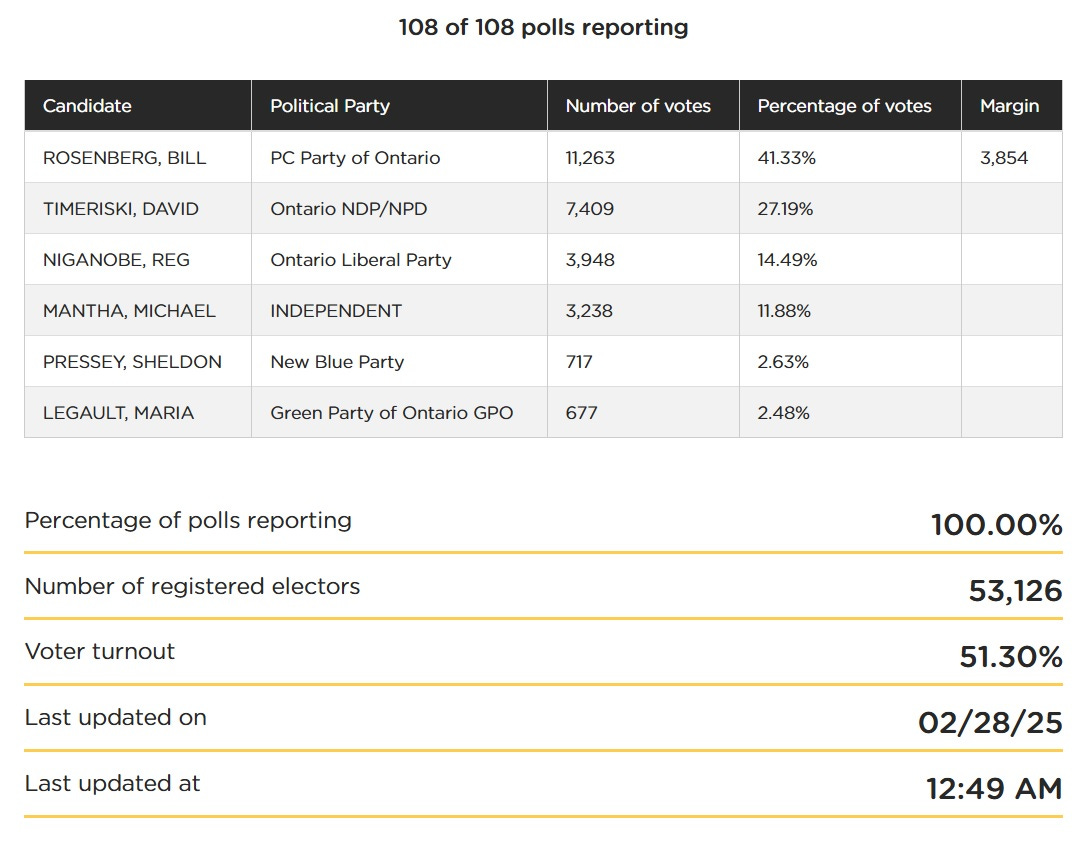
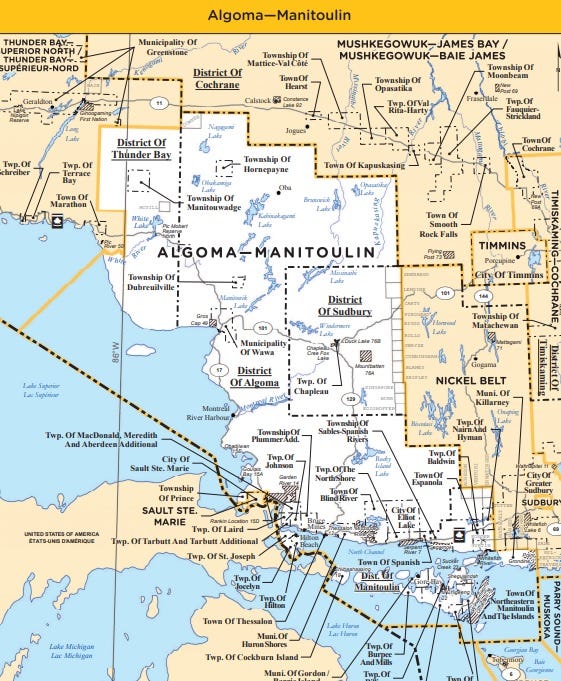
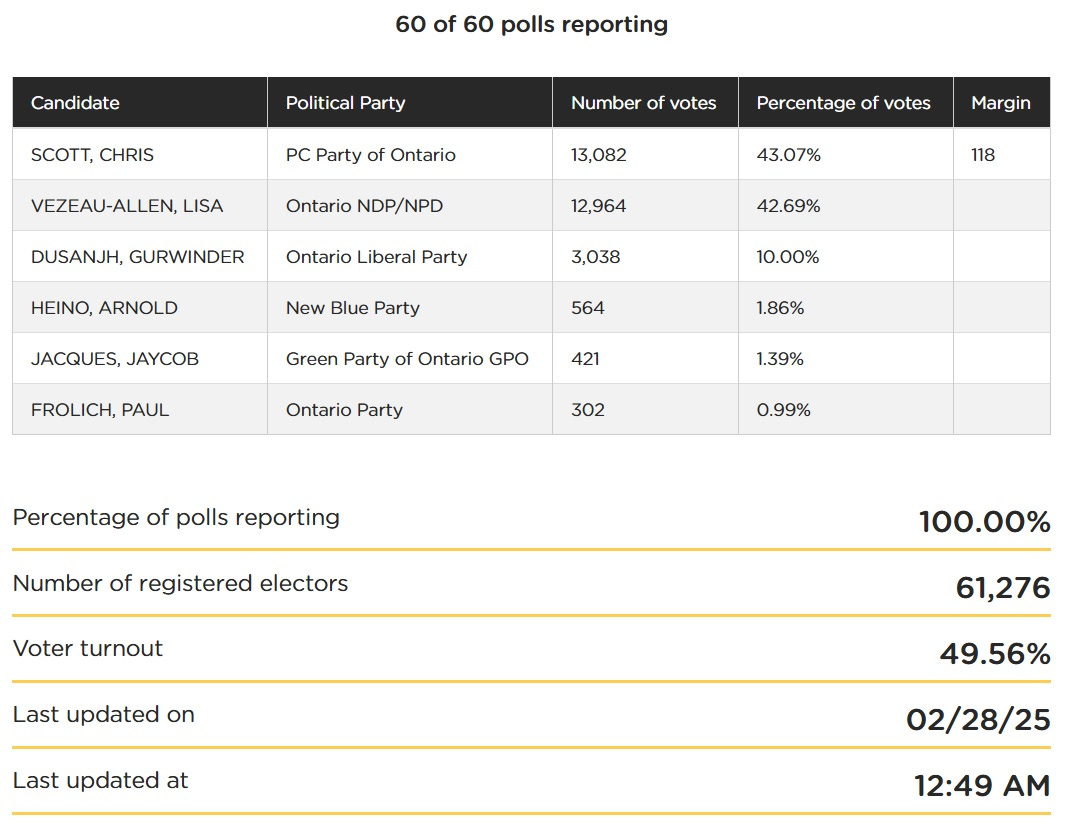
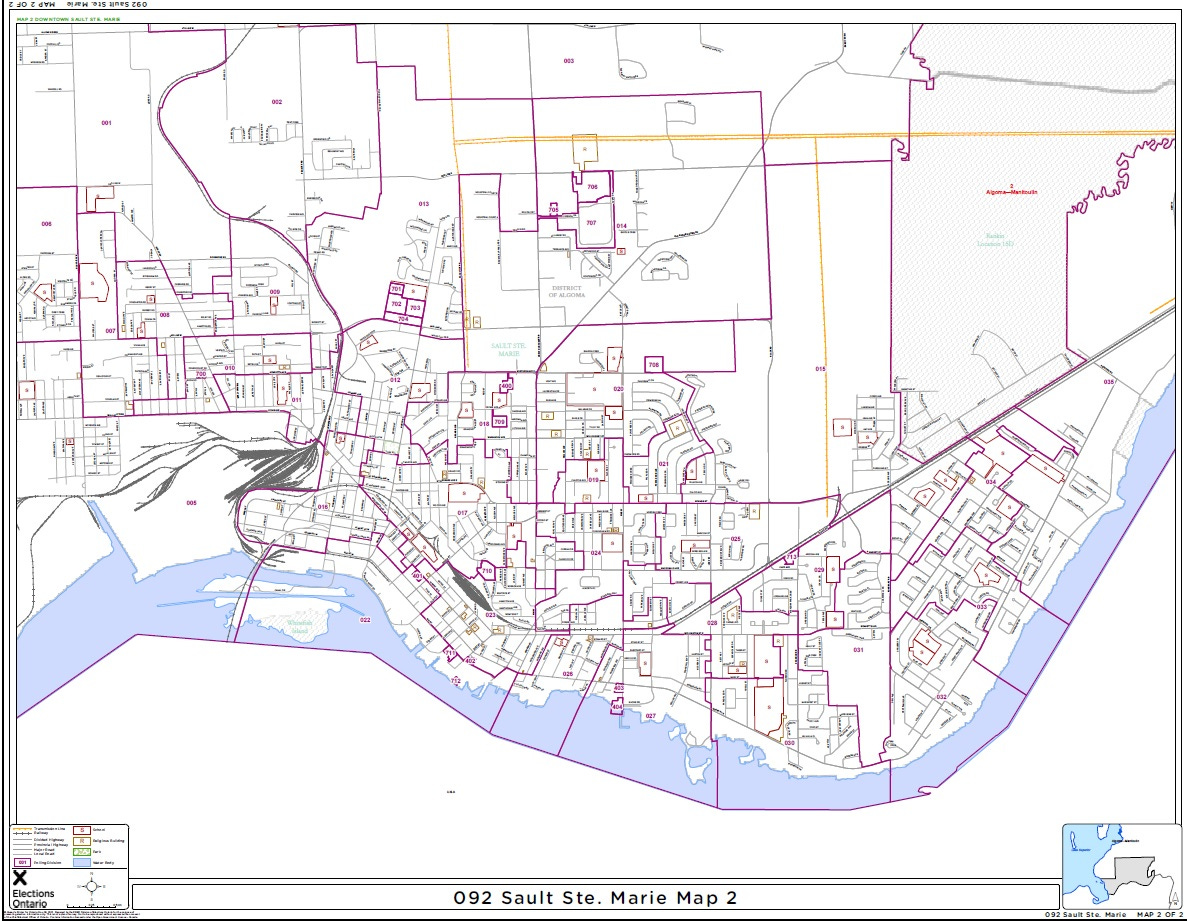
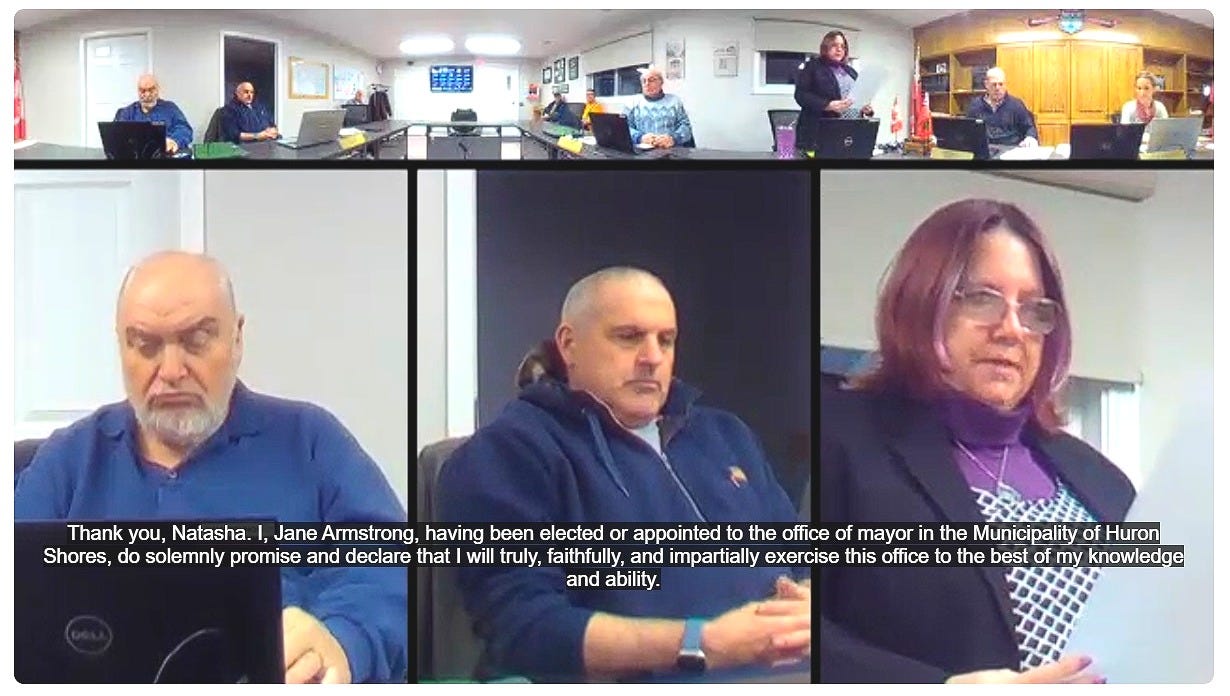
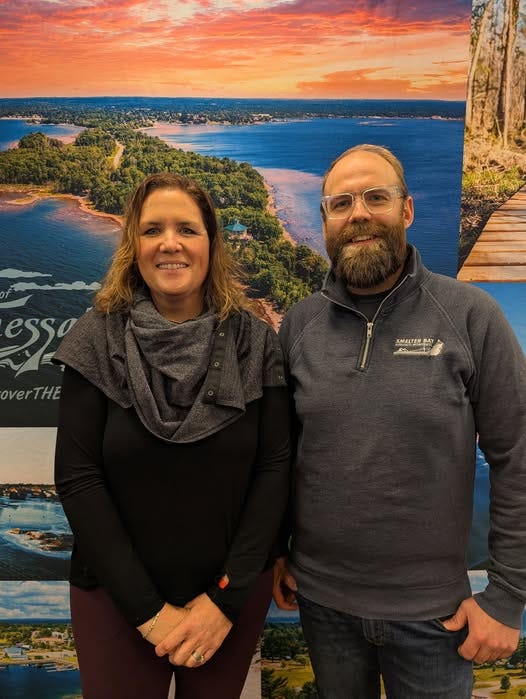
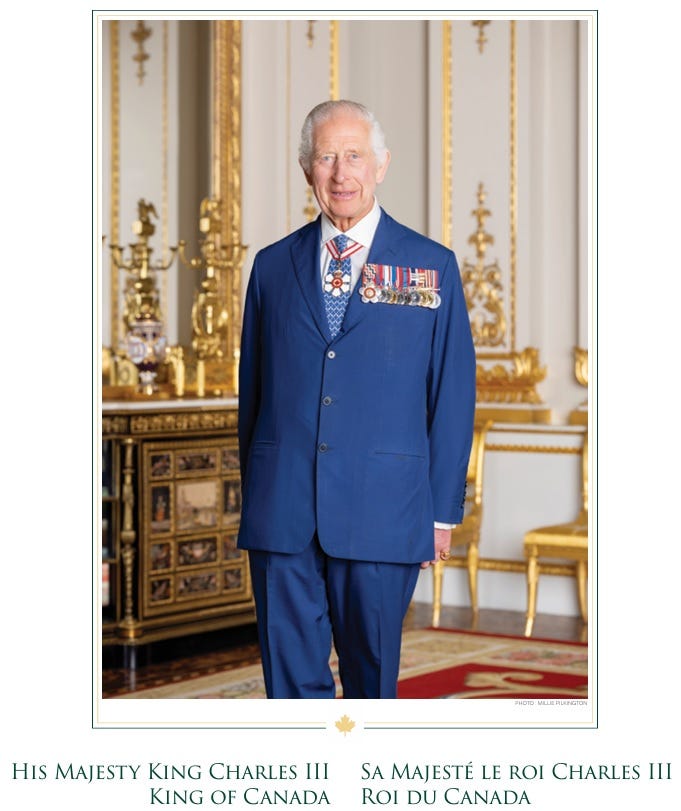


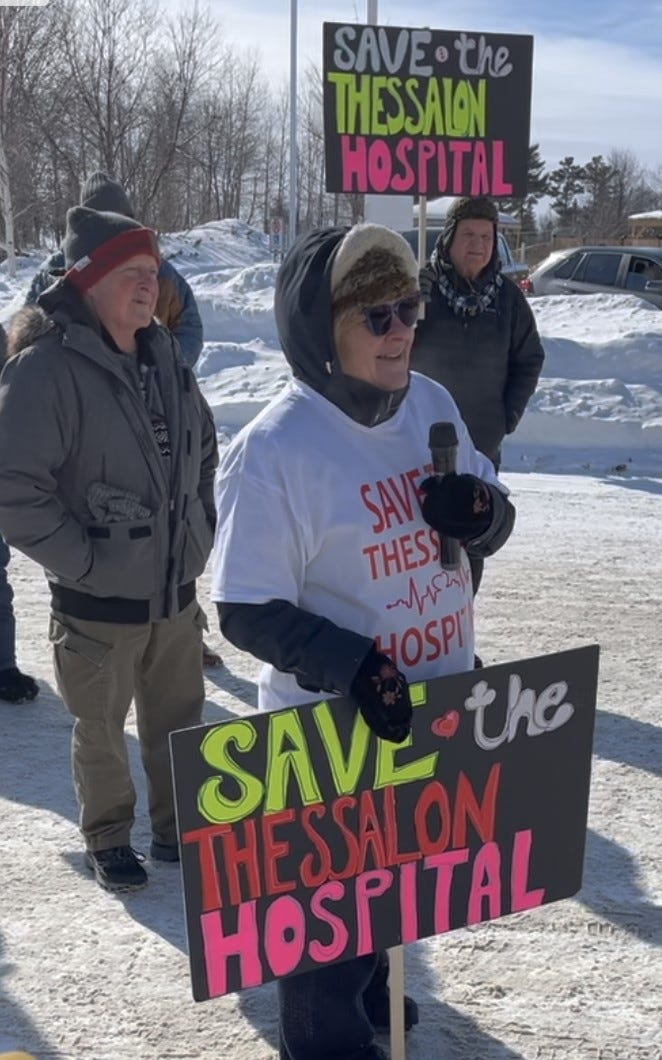
It is only a matter of time before Trump takes a run at siphoning water out of the Great Lakes.